December 16, 2016
Air Date: December 16, 2016
FULL SHOW
SEGMENTS
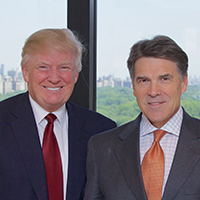
Trump’s (Mostly) Anti-Climate Crew
View the page for this story
President-Elect Donald Trump's cabinet choices tilt toward climate denial. Living On Earth Host Steve Curwood and former Republican Congressman Bob Inglis discuss how the Trump nominees for Environmental Protection Agency Administrator, Energy Secretary and Secretary of State might lead on the environment and climate policy. (12:00)
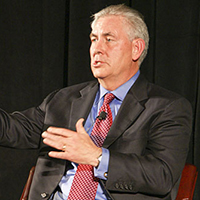
Beyond The Headlines
/ Peter DykstraView the page for this story
Peter Dykstra and host Steve Curwood examine some of the incoming Trump administration nominees and their records on energy and the environment. The pair also note good news on wind energy, and discuss a Nobel Prize winner whose invention had unintended consequences for both food production as well as World Wars 1 and 2. (04:20)
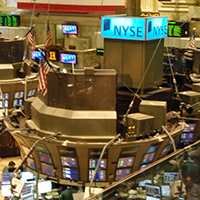
Bad Air As Stock Market Bear
View the page for this story
High levels of fine particulate air pollution can lower the stock market, a team at Columbia University has found. Team leader Matthew Niedell, an associate professor at Columbia University, discusses the findings with Host Steve Curwood. (07:30)
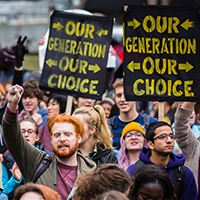
Fossil Fuel Freedom Fighters
View the page for this story
A new generation of nature writers is coming of age in America, and understanding how much of the pristine landscape their parents and grandparents enjoyed has gone. These new writers’ work is collected in the book Coming of Age at the End of Nature. Activist Bonnie Frye Hemphill reads and discusses part of her essay “Fossil Fuel Freedom Fighters”, and explains why, despite difficult odds, her generation is working towards a transition away from fossil fuels. (05:40)
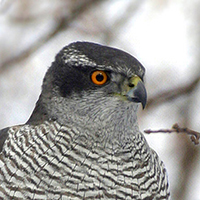
BirdNote: Northern Goshawk
/ Michael SteinView the page for this story
In the wintry boreal forest of North America, an impressively large and fast raptor seeks its prey. As Michael Stein explains, falconers have admired the Northern Goshawk, the largest hawk of the northern forest, for centuries. (01:55)

Tom Friedman on the Age of Acceleration
View the page for this story
New York Times columnist Tom Friedman’s latest book, is called “Thank You For Being Late: An Optimist’s Guide to Thriving In The Age Of Accelerations.” It explores how diversity provides resilience to help cope with a world of rapid globalization, technology development and climate change. Tom Friedman discusses his insights with Living On Earth Host Steve Curwood. (10:00)
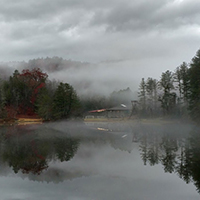
Friendship, Faith and Firefighters
/ Sean PowersView the page for this story
Hundreds of firefighters from all over the country battled the Rock Mountain Fire in North Georgia this autumn. And southern hospitality helped them win the battle against the blaze: a local Orthodox Jewish camp opened its doors to these crews. Reporter Sean Powers visited the campsite. (05:10)
Show Credits and Funders
Show Transcript
HOST: Steve Curwood
GUESTS: Bob Inglis, Matthew Niedel, Bonnie Frye Hemphill, Thomas Friedman
REPORTERS: Peter Dykstra, Sean Powers, Michael Stein
[THEME]
CURWOOD: From Public Radio International, this is Living on Earth.
[THEME]
CURWOOD: I'm Steve Curwood. President-elect Trump has selected several climate change skeptics for his cabinet, and that could put US leadership on global warming action in jeopardy.
INGLIS: The whole world essentially agreed at Paris that we need to do something, and typically what the world has relied on America to provide is the leadership role and so the whole world is waiting for America to continue to lead or to abdicate that leadership role.
CURWOOD: Also, appreciating the teams who put their lives on the line to save people and property from devastating wildfires.
PATRICK: It actually kind of brings a tear to my eye every time I think about it, but we were driving through a town and you have children on the side of the road saying, “You are heroes,” and smiling and waving and saying thank you and ... [SNIFFLES] Excuse me, and you can’t beat that.
CURWOOD: Those stories and more this week on Living on Earth. Stick around.
[NEWSBREAK MUSIC: Boards Of Canada “Zoetrope” from “In A Beautiful Place Out In The Country” (Warp Records 2000)]
[THEME]
Trump’s (Mostly) Anti-Climate Crew
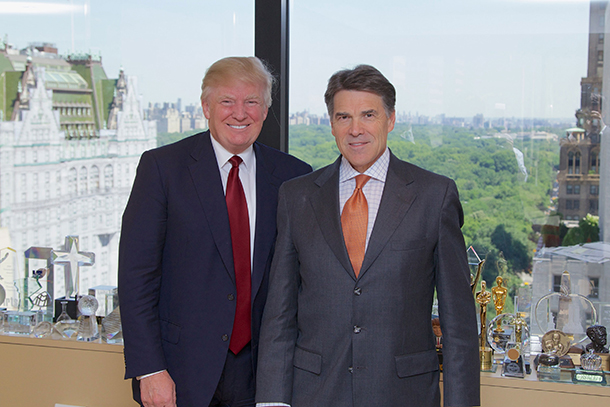
Former Texas Governor Rick Perry visited Donald Trump in New York City in 2013. (Photo: Governor Rick Perry, Flickr CC BY-NC-ND 2.0)
CURWOOD: From the Jennifer and Ted Stanley studios at the University of Massachusetts Boston and PRI, this is Living on Earth. I’m Steve Curwood. President-elect Donald Trump has a somewhat ambiguous stand on the need for climate action, at times calling global warming a hoax and at other times saying he has an open mind. So far his cabinet selections reflect that ambiguity. Mr. Trump named Oklahoma Attorney General Scott Pruitt as Administrator of the Environmental Protection Agency and former Texas governor Rick Perry as Secretary of Energy, and both men deny the science of climate change.
On the other hand Mr. Trump has selected ExxonMobil CEO Rex Tillerson to be Secretary of State, a man who has spoken in support of the Paris Climate Agreement, though his company does have a troubling history of climate denial.
For a Republican perspective on these choices we turn now to former South Carolina GOP Congressman Bob Inglis, who is a strong proponent of a carbon tax, and director of the free-market environmental organization, RepublicEN. Welcome back to Living on Earth, Congressman.
INGLIS: Great to be with you, Steve. Thank you.
CURWOOD: So, what was your immediate reaction when you heard that Scott Pruitt had been nominated to head the EPA by the Trump administration?
INGLIS: Well, it is alarming when somebody that's going to be put in charge of the EPA seems to have the goal of undoing what the EPA does, and that's...you want to someone to have passion for their work, but not exactly...I guess this is sort of un-passion. It's like passionate for undoing the work of the agency that he would head.
CURWOOD: How do you think his antifederal regulation ideology will inform his decisions as head of the Environmental Protection Agency?
INGLIS: I think you have the right word, Steve. The concern is "ideology". I can identify with this because for six years in Congress, I said climate change was hooey, nonsense, don't need to worry about it. I didn't know anything about it except that Al Gore was for it, and I was from a red state so therefore I chose teams. It was a rather an ignorant position on my part. But if you can move away from the ideology and say, listen, it matters not blue flag or a red flag. Let's not rally to this flag of a partisanship ideology. Let's rally to the American flag, and to the flag that can lead the world, you know. And so, ideology is what concerns us, yes, about Mr. Pruitt. Can he open his mind to the science of climate change?
CURWOOD: Now, Mr. Pruitt has that the American people are, well, we're tired of seeing billions of dollars drained from the economy due to what he calls “unnecessary EPA regulations”. What do you expect him to roll back on?
INGLIS: Well, the early returns aren't good, and they indicate that he's mostly looking at rolling back all action on climate change. We, at RepublicEN.org aren't big on the Clean Power Plans as a regulatory...it's a very clumsy way of dealing with climate change. Now, in fairness to President Obama, the reason he did that is that he couldn't get through Congress what I'm talking about, and if he were on the line with us right now I think President Obama would say, Inglis, listen, if you had some votes in the Republican conference for what you're talking about I could've worked on that, and I would have happily worked on that because it would be a worldwide, economy-wide solution. But you don't have those votes, and that's why I had to do the Clean Power Plan. But, so if Scott Pruitt is talking about a different approach that's OK, but to have no approach...well, that's really a problem if you're charged with protecting our air and water and land at the EPA.
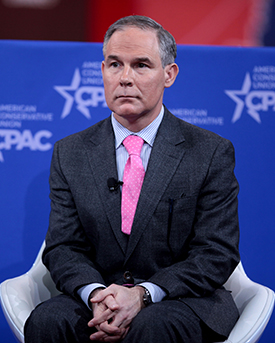
Oklahoma Attorney General Scott Pruitt at the Conservative Political Action Conference (CPAC) in National Harbor, Maryland. (Photo: Gage Skidmore, Flickr CC BY-SA 2.0)
CURWOOD: Well, Congressman Inglis, what do you make of the nomination of Rex Tillerson for Secretary of State? Mr. Tillerson is on the record for saying there should be a carbon tax and that the Paris climate deal is a good thing. How does he fit in with the Trump crew?
INGLIS: In some ways, I'm very excited about Rex Tillerson's role here. I have concerns that are unrelated to that about, you know, the friend of Russia and all that. That's separate, but if we're talking about the climate action know the good news about Rex Tillerson is for years now he has said that the way to fix this problem is to have a revenue neutral, that means you cut taxes somewhere else if you're going to put on a carbon tax. Border adjustable, that means you impose it on imports as though they were produced here. Revenue neutral border adjustable carbon tax. So, we at RepublicEN.org have long endorsed the Exxon plan on that. They haven't endorsed us. We would like for them to endorse us, but they haven't done so. But we also believe that the company ExxonMobil is the most important company on the planet for solving climate change. The company stands to make a lot of money on a carbon tax. Well, now, we think that's great. They could be a very important force on the planet for solving climate change, and I hope that Rex Tillerson will take those views into the cabinet room and say that to President Trump.
CURWOOD: Well, a lot of folks, though, are saying that the that the major oil companies, the big oil companies, are a problem for climate protection with their power, and say that Mr. Tillerson will likely be approving Keystone XL if it came in front of the State Department again and other gas and oil pipelines, although we don't know his stand on the route of the Dakota access pipeline. What do you say to folks who say that these fossil fuel companies and the company that Mr. Tillerson has built are really central to the problem of climate protection?
INGLIS: Well, and, of course, there are some legal actions against ExxonMobil at this point about what they knew and when they knew it, whether they were deceiving shareholders. That's quite an issue for them because you know if those allegations were proven it would make the tobacco cases look like a Sunday school account, you know, I mean, we're talking damages that would really make the tobacco case look like a very small case. So, and it depends on what company you're talking about. In the case of ExxonMobil, their portfolio, as I understand it, has a great deal of natural gas, and so what I was saying earlier makes sense. They would do well in a carbon tax environment.
If your portfolio is more petroleum and less natural gas then where you sit determines where you stand. You might not be for a carbon tax. But I hope that Rex Tillerson would be able to have that kind of influence on the administration, and by the way, Steve, we at RepublicEN.org have got sort of a strange position compared to our friends on the environmental left on those pipelines. We think they’re fine to build. That's the best way to transport those products. If you price carbon dioxide, though, what's passing through there might not pass so much in a carbon priced environment, and so if somebody wants go ahead and build what may turn out to be a white elephant pipeline, go right ahead, knock yourself out. So we hope they're factoring that into their decision-making about whether to spend all that money on those pipelines, but if they're not, woe to them because what I think most...Where the smart money has already gone on this is the smart money assumes there's going to be a price and carbon dioxide and it's going to affect the value of projects like Keystone XL.
CURWOOD: You mentioned that Exxon, of course, is dealing with charges from a couple of states Attorneys General at least on covering up what they knew about climate disruption and fossil fuels. How much is Rex Tillerson tainted by that historic Exxon denial, do you think?
INGLIS: It'll be interesting to have him under oath answering questions. Of course, he's going to be answering questions. I would think that those can be very difficult questions to answer because it could...It's sort of like Donald Trump's tweets. It could affect the market price of Exxon stock depending on what those answers are, you know, and so I would think that he's going to have very careful legal counsel on how and what he can answer. I generally understand from press accounts, and I don't…have no independent information on this, but that he was a force behind changing the company's funding of the denial machine. I don't know that for sure though and that's a guess what will be the issue in the confirmation hearings, is "Mr. Tillerson, were you continuing the denial payments or were you at the helm moving the company away from those denial payments?" It's pretty clear that they used to deny...They used to be a major funder of the denial machine.
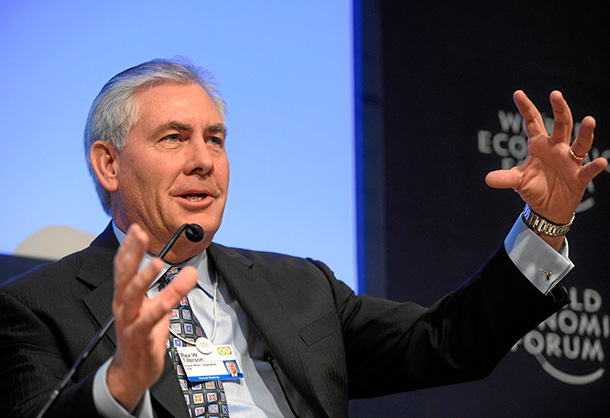
ExxonMobil CEO Rex Tillerson. (Photo: World Economic Forum, Flickr CC BY-NC-SA 2.0)
CURWOOD: And, Bob, what you make of Mr. Trump's selection of former Texas Gov. Rick Perry as Secretary of Energy? And you may recall that during the Republican primary debates Rick Perry famously couldn't remember the name of the Department of Energy as one of three departments he said he'd abolish.
INGLIS: Saturday Night Live would have an awful lot of fun with that. I think that… I have heard it said that Rex Tillerson would've been a great choice for Department of Energy because obviously he knows more about energy than anybody else, really, nearly, on the planet, so I don't know how much Rick Perry knows about that. I assume that by being in Texas he's had a great deal to do with energy. The question is whether he knows much about the nuclear stockpile and the issues involved there, so it's another case where somebody would be at the top of an agency with passion for undoing the agency rather than passion for doing the work of the agency.
CURWOOD: So, what kinds of support do you think there is in the incoming Congress for a major tax overhaul that would include a revenue neutral carbon tax?
INGLIS: I think it's stronger than it looks. On the surface it looks like there wouldn't be much support, but it's sort of like what's going to happen in healthcare. If you go forward with repealing the Affordable Care Act, then that has a real impact on some real people's lives, and so same the thing happens on climate change. If you repeal the Clean Power Plan, if you say that was not the right answer, and as we said earlier we at RepublicEN.org don't think it's right answer, we think there is a much better answer, but if you once you are in control and have power and you undo something, then it becomes incumbent upon you to propose the alternative, and so the incoming Congress, while on the surface it looks like they're not so into some sort of tax reform that would involve an inclusion of a carbon tax and cutting taxes elsewhere, it could well become incumbent upon that Congress to do exactly that because of the undoing of the Clean Power Plan.
CURWOOD: Today, how much of the incoming Congress is onboard with the validity of climate science?
INGLIS: You know, it's interesting, Steve. It's hard to know because typically what people like me at RepublicEN.org do is, we ask people way too often if they believe in climate change. What we really need to be asking them is, "Do you think we can solve climate change and particularly if it's a conservative, ask the question this way, "Can free enterprise solve climate change?" That starts a very different conversation because what's gone on too much is that we who are concerned about climate change typically ask a belief question, and it's sort of like asking if you believe in our religion of climate change, and, if you come from a red state, no, you don't buy in to that religion. But, if we change the question and start the conversation a different place, we think we can have a much more successful conversation.
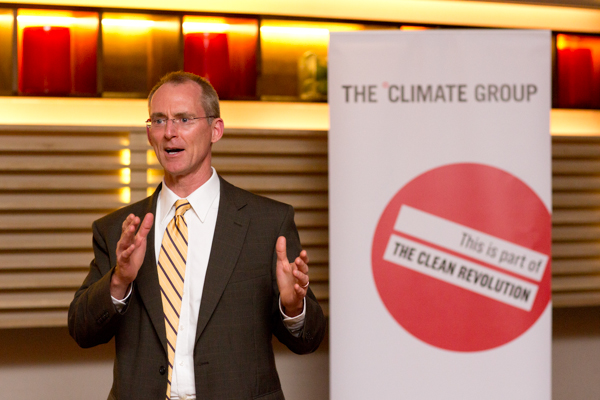
Republican politician Bob Inglis advocates for free-enterprise action on climate change. (Photo: The Climate Group, CC BY 2.0)
CURWOOD: Bob Inglis is a former Republican congressman from South Carolina. Thanks so much, Bob, for taking the time with us today.
INGLIS: Great to be with you, Steve.
Related links:
- More on former Congressman Bob Inglis
- Our previous reportage on Scott Pruitt’s EPA lawsuits
- Rick Perry’s three agencies debate stumble
- Track all of Trump’s nominations here
- RepublicEn Website
[MUSIC: Tom Teasley, “Setzuan Blues” on All the World’s a Stage, t&t Music (or t2 Music)]
CURWOOD: Coming up...why a down day on the stock market might be linked to bad air. Stay tuned to Living on Earth.
ANNOUNCER: Support for Living on Earth comes from the Gordon and Betty Moore Foundation, and from a friend of Sailors for the Sea, working with boaters to restore ocean health.
[CUTAWAY MUSIC: Santana, “El Farol” on Supernatural, C. Santana/KC Porter, published by Stellabella Music/Olinga Music, Arista Records]
Beyond The Headlines
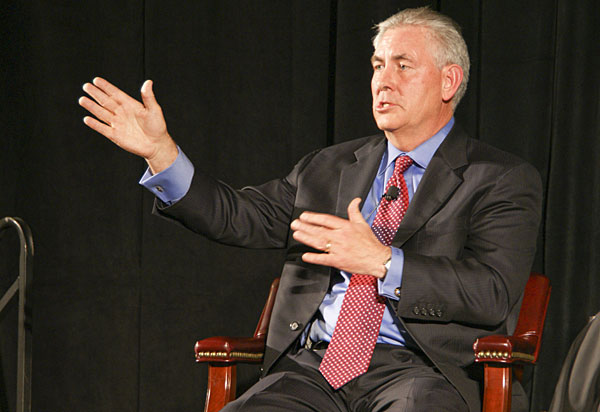
Rex Tillerson, the CEO of oil giant Exxon Mobil, is President-elect Donald Trump’s pick for Secretary of State. (Photo: William Munoz, Flickr CC BY 2.0)
CURWOOD: It’s Living on Earth, I’m Steve Curwood. Let’s check in with Peter Dykstra of DailyClimate.org and Environmental Health News, EHN.org, now, for some more analysis of the political landscape based on his careful probing beyond the headlines. Peter’s on the line from Conyers, Georgia. Hi, Peter, how are you doing?
DYKSTRA: Hi, Steve. You know, this is gonna be a real shock to you, but I’ve got a few more things to say about energy, environment, and the incoming administration.
CURWOOD: Well, I think I’d be shocked if you didn’t have anything to say. Fire away.
DYKSTRA: Well, President-elect Trump’s staff and cabinet appointments have pretty much run the table on climate denial. Just about the only nominee who’s willing to acknowledge that climate change is a problem is Rex Tillerson, and he’s the CEO of ExxonMobil.
CURWOOD: So, how do you think Mr. Tillerson is going to handle that?
DYKSTRA: Well, he supported the Paris Climate Agreement and he’s called for a carbon tax, but he describes climate change as primarily an “engineering problem” for which we can build solutions and adapt. And remember that for 40 odd years he’s been working for a company that actively promoted climate denial and disinformation. May I say a few words about our nominee for the Secretary of Energy?
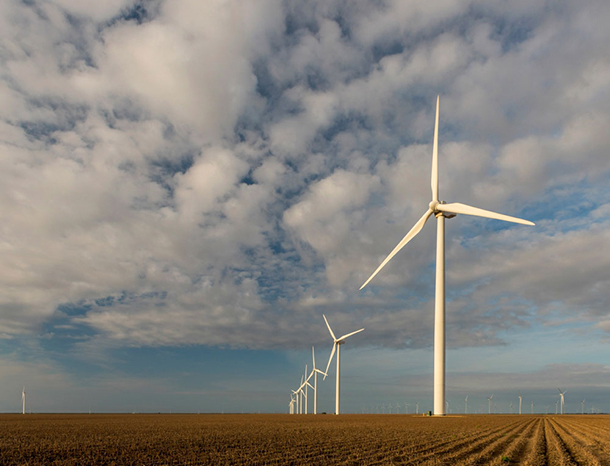
The Los Vientos Wind Farm in Texas (Photo: Duke Energy, Flickr CC BY-NC-ND 2.0)
CURWOOD: Oh yes, former Texas Governor Rick Perry. Go right ahead.
DYKSTRA: Rick Perry joins the growing list of cabinet-level, climate-denying nominees. And when he ran for President last time, he promised in a debate that he’d abolish three Cabinet departments – Commerce, Education, and ... ummmmm. It’ll come to me.
CURWOOD: Oops! He couldn’t remember the third one which was the Department that he’ll now be in charge of.
DYKSTRA: Yes, the Governor’s loyal to oil, all right. How far we’ve come. In 2008, President-elect Barack Obama nominated Steven Chu, a Nobel Laureate in Physics to run DOE. Eight years later, President-elect Trump nominates a guy who boosted his visibility by strutting his stuff on Dancing With the Stars.
And, lest we forget: The bulk of the energy department’s budget is devoted to the maintenance of America’s nuclear weapons stockpile, and multi-billion dollar cleanups of the messes we made building those weapons. So step lightly, Governor Perry.
How about a couple of pieces of good news on clean energy?
CURWOOD: Hey, go right ahead. I’m always ready for good news.
DYKSTRA: So let’s start with Rick Perry’s home state. Earlier this month the Texas wind industry broke its all-time record, which had just been set a few weeks before in mid-November. On a particularly blustery Sunday afternoon, Texas windfarms kicked in to produce 15,000 megawatts of electricity.
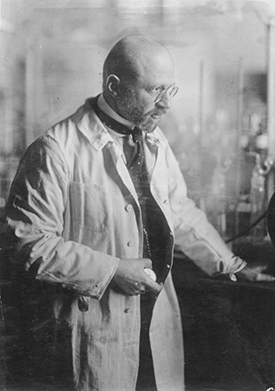
Nobel Prize-winning Chemist Fritz Haber in his laboratory c. 1905 (Photo: German Federal Archives, Wikimedia Commons CC BY-SA 3.0 DE)
CURWOOD: 15,000 megawatts, Peter. That’s of course a big number, but put that into some perspective for us, would you?
DYKSTRA: Well, it’s enough to power 60 million home computers. At the time the record was set, it was also equal to about 45 percent of all electricity being consumed in Texas. And the incoming Energy Secretary likes wind power, by the way. The industry expects to beat its all-time record with regularity in the coming years.
CURWOOD: And you know what they say about doing things big in Texas.
DYKSTRA: Oh, yeah. The other good news comes from a not-so-big state, Rhode Island, where America’s first offshore wind farm just started generating power to the grid. Five turbines, 30 megawatts. It’s nowhere near as big as the Texas output, but still enough to power a computer for almost every resident of the city of Providence. And maybe a sign of things to come in the energy industry, no matter who’s running the DOE, if there is a DOE.
CURWOOD: Well, indeed. Hey let’s take our weekly stroll now through environmental history.
DYKSTRA: Well, it’s the season when they hand out the 2016 Nobel Prizes in Stockholm, and December 9 was the birthday of a Nobel-winning chemists who kind of presaged the TV show “Breaking Bad.”
Fritz Haber was born on December 9, 1868. He won the 1918 Chemistry Prize for developing synthetic ammonia. Largescale production of ammonia led to largescale production of fertilizer, which made it easier to feed billions. But it also made it easier to produce explosives and chemical weapons, and synthetic ammonia may have helped Germany to stretch out World War I for an extra year. And come World War II, synthetic ammonia was key to operating Hitler’s gas chambers. But by then, Fritz Haber had left Germany after he was forced out of his university post due to his Jewish heritage. He died before World War II began.
CURWOOD: What a sad and ironic story and a reminder that science can be a force for good or evil. Peter Dykstra is with Environmental Health News, that's EHN.org and DailyClimate.org. Thanks, Peter, talk to you again real soon.
DYKSTRA: OK, Steve, thanks a lot. Talk to you soon.
CURWOOD: And there’s more on these stories on our website, LOE.org.
Related links:
- Peter Dykstra reports on Rex Tillerson and Exxon’s renewables efforts
- CNN Money: “Behind the deep ties between Exxon’s Rex Tillerson’s and Russia”
- Washington Post: “Rex Tillerson’s view of climate change: It’s just an ‘engineering problem’
- NPR: “Donald Trump Taps Rick Perry To Head Agency He Once Forgot”
- ABC News: “1ST US Offshore Wind Farm Opens off Rhode Island’s Coast”
- Texas wind power blows away old record
- Fritz Haber’s controversial Nobel Prize in chemistry
[MUSIC: Khaled, “Melha” on Kenza, arr. Steve Hillage, ARK 21 Records]
Bad Air As Stock Market Bear
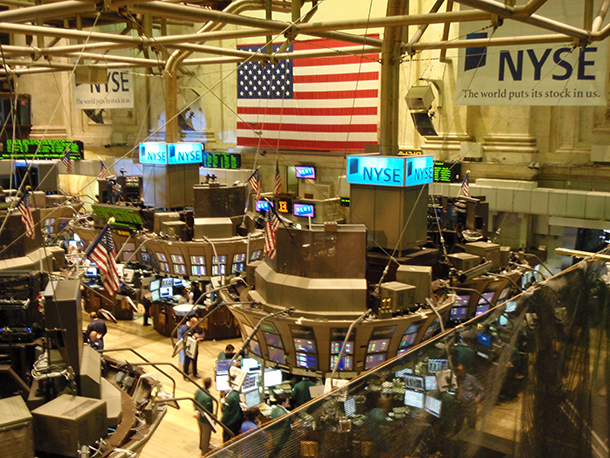
The trading floor of the New York Stock Exchange, the site of Prof. Niedell and colleagues’ recent research on the impacts of particulate matter. (Photo: Ryan Lawler, Wikimedia Commons public domain)
CURWOOD: People close to the stock market like numbers, and there is a new one that might catch their attention - 2.5. That’s the size in microns of the tiny particles of air pollution that researchers at Columbia University say seem to change investor behavior, at least in New York City. When amounts of 2.5 particulate pollution goes up the market goes down by small but measurable amounts, says Professor Matthew Niedell. Here’s what his team was looking at and how levels of 2.5 PM pollution in Manhattan air could move the stock market.
NIEDELL: In this research what we're doing is building a lot of previous research that has been finding various effects of air pollution on the well-being of humans beyond just health. So, in this study what we wanted to do was look at its impacts on investors at the New York Stock Exchange and the relationship between fine particular matter and returns on the S&P 500.
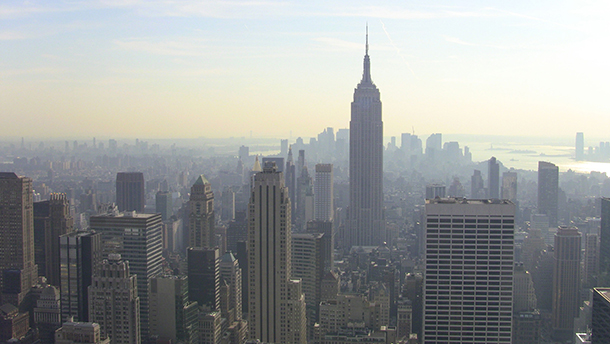
The New York City skyline with haze of air pollution. (Photo: Nicolas Halftermeyer, Wikimedia Commons CC BY-SA 4.0)
CURWOOD: When we talk about these particulates, what exactly we talking about?
NIEDELL: So, fine particulate matter are very small particulates less than 2.5 microns, something that you can't see with the human eye. They come from natural sources such as forest fires and volcanoes but a lot of what we see in cities comes from combustion of fossil fuels. Given how small they are they're able to penetrate deep within our body, they pass through our lung barrier and into our blood where they can have effects that way. Because they're so small, that also makes them penetrate from outdoors to indoors.
CURWOOD: And I understand that you looked at the time of day that people are exposed to this?
NIEDELL: Right, so what we did was we had an air pollution monitor that was very close to the Exchange. Through that monitor, we had hourly measures of air pollution, and we were able to look at the particular hours at which air pollution was reaching a certain level and look at the returns on the S&P 500 on that day.
CURWOOD: And what did you find?
NIEDELL: First of all, we found when the entire day had a higher level of particulate matter we saw the S&P 500 dropped. But in particular we found that particulate matter levels, when they were higher in the morning and throughout the early afternoon, had the biggest impact on the S&P 500.
CURWOOD: So, what surprised you the most about these results?
NIEDELL: So what surprised us the most was the fact that we found any relationship at all. We had a small, little inkling that there might be a relationship between these two, but we were going a bit on a whim. There's a story for why there could be a relationship, but it wasn't the strongest story in the world and we were surprised to find as robust of an effect as we found. What's interesting about this is that in New York City the air quality is actually surprisingly good. So, if we're doing a study in Beijing or we're doing something in London, where air quality is generally worse, we might see much bigger changes.
CURWOOD: What was the story that suggested there might be something to be found here?
NIEDELL: So, the main story that we had in mind was that air pollution would be related to the mood and the cognitive performance of traders. There's evidence that suggests when people's mood drops, or their cognition underperforms that they tend to become more risk averse in the decisions that they make. They go away from from stocks and shift toward bonds. Bonds are kind of safer bets, and stocks are riskier bets. So, if people are going away from stocks and going to bonds, we would see the price of the S&P 500 drop. It's not something that we've definitively proved in the study. What we do is, we look at something called the volatility index, which a lot of people use as a measure of trader fear, and what we find is that on days with higher fine particulates, we also see a decrease in that index which is used to indicate that there's an increase in trader fear and we think that's suggestive of risk aversion being what's driving the results.
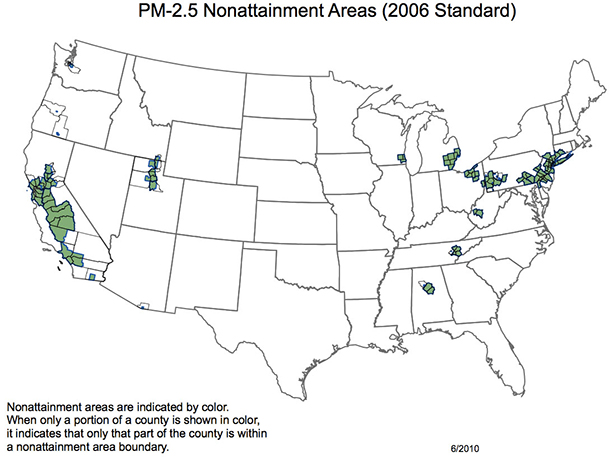
Fine particulate matter (PM 2.5) presents a significant health threat in some major cities in the United States, including New York City. (Photo: Environmental Protection Agency, Wikimedia Commons public domain)
CURWOOD: How big a deal is this, when you say that a lot of PM2.5, those fine particulates in the air would depress the return on the S&P 500, and at the New York Stock Exchange? Just how much of a depression there?
NIEDELL: The effect isn't very big. A very large change in particulate matter is only leading to a pretty moderate to small size effect on returns. What we think is important about it is two things. So, the first is that there's a strong held belief that stock markets work efficiently, something called the efficient market hypothesis, that the price of a stock solely reflects the expected future profitability of a firm, but our research shows, which other research has shown before, is that there's more to it than just that. There's a role for moods and emotions and things like that in affecting a stock price. The other thing that we think is interesting from a policy perspective is pollution is affecting the performance of workers in a sort of high skilled occupation in a very knowledge-based setting and we think that has important implications for the effects on the economy in a broader level.
CURWOOD: Interesting. Now, as my friend Dave Brancaccio is fond of saying, let's do the numbers. How big is this effect on a really big day?
NIEDEL: On a really big day if particulate matter goes from the bottom 25th percentile, or the best quartile, to to the worst quartile, to 75th percentile, we would see that returns would decrease by two basis points, which is a .02 percent decrease, so it's not the most enormous effect, but we do see them. They are statistically significant effects, and they are somewhere in magnitude to the effects from other things that have been shown to affect returns.
CURWOOD: And when you say basis points folks might think of that as simply two cents on a dollar. People make a lot of money on Wall Street squeezing, you know, a 10th of a penny out of transactions consistently.
NIEDEL: They do. They do. And it's interesting because we actually had that same idea to say, hey, can we use this as a way to make money off of this? If we know something about air pollution that the traders don't know.
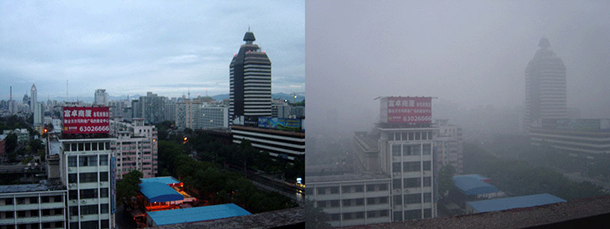
Contrast between a rainy day and a smoggy day in Beijing, where Prof. Niedell suggests the effects of particulate matter on trading behavior may be more extreme. (Photo: Bobak Ha’Eri, Wikimedia Commons CC BY-SA 3.0)
CURWOOD: How much, over time, do you think a savvy trader who knows of the effects of fine particulate pollution on the minds of traders there at Wall Street...How much money do you think could be made by somebody who is willing to short the market on those days?
NIEDEL: So, at this point it would hard for people to make money off of it. The way we see people make money in the stock market is if they have some information that other people don't have. So if you knew something about what air quality was going to be an area, and you knew that it would affect stock prices then that might be an opportunity for somebody to make money off of it. But in this case, now that this research is out in the public, everybody has access to this information. So, it's not clear that somebody would have an advantage in using this information.
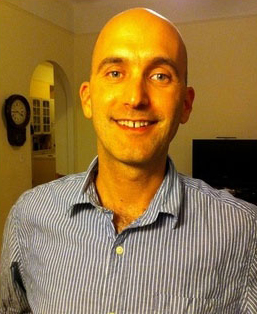
Matthew Niedell, Associate Professor in the Mailman School of Public Health at Columbia University. (Photo: courtesy of Matthew Niedell and Columbia University)
CURWOOD: Now, you study public health and the economics of it. If fine particulates are having this kind of impact on the minds of folks who are trading stocks, how might this be affecting the rest of our economy when we have this kind of pollution?
NIEDEL: Well, that's what we thought was the particularly interesting aspect of this study. It could possibly be affecting everybody. There's been previous work looking at particulate matter and its effect on workers in sort of a manual, more physical labor settings, and this is showing that this work doesn't just apply to people that are in that sector, but it applies to a much broader sector so these effects could be affecting everyone, even the two of us on a day like today depending on what pollution levels are like.
CURWOOD: Matthew Niedell is Associate Professor of Health Policy Management at Columbia. Thank you so much for taking time with us today.
NIEDELL: All right. Thanks a lot for having me.
Related links:
- “The Effect of Air Pollution on Investor Behavior: Evidence from the S&P 500”
- “Particulate Pollution and the Productivity of Pear Packers”
- The Washington Post: “New research shows air pollution might make you bad at your job”
- Harvard Business Review: “Air Pollution Is Making Office Workers Less Productive”
- Listen to our previous story: “Better Office Air Makes For Better Thinking”
[MUSIC: Khaled, “Melha” on Kenza, arr. Steve Hillage, ARK 21 Records]
Fossil Fuel Freedom Fighters
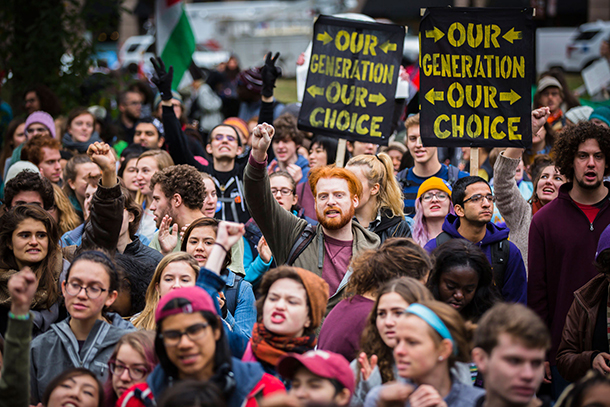
The fossil-free fight may be energized by youth, but Bonnie Frye Hemphill says there’s room for older generations in these movements as well. (Photo: John Silvercloud, Flickr CC BY-SA 2.0)
CURWOOD: More than a century ago the powerful nature writing of John Muir, Henry David Thoreau, and others inspired the protection of some of the most scenic treasures of the American landscape. But ever since Bill McKibben wrote “The End of Nature,” in 1989, there’s a new understanding that just about no part of the landscape is untouched or unaffected by modern humans. And much of the millennial generation has no direct experience of wild untamed nature. But a recent anthology of essays by millennials, called “Coming of Age at the End of Nature,” shows that they are engaging in new ways with our environment, and the forces affecting it. Today, we have another of these essays.
[MUSIC: Rockaby Baby! Lullaby Baby Trio, “Get Up, Stand Up” on Lullaby Renditions of Bob Marley, Bob Marley, Rockabye Baby Music.
HEMPHILL: My name is Bonnie Frye Hemphill. Here's an excerpt from my essay called, "Fossil Fuel Freedom Fighters".
Everything and nothing about the planet has changed in my lifetime. I am 27. Everything because I have never known a time when our home didn't have a man-made fever and nothing because we've done so little to stop stoking it. "Global warming is all we've ever known," Ben Lowe, a founder of Young Evangelicals for Climate Action explained to the Wall Street Journal. This conundrum makes the McKibben's 1989 book, "The End of Nature" into Cassandra and a time capsule - prescient, ignored and almost buried. My grandmothers have told me stories of the World War II years, when Americans knew they had to work together and hard because justice was not a given.
My parent’s generation then fought for social and environmental action, but they thought they could fully succeed. Their sign said, "Save the Earth" because they thought they could. Like my grandmothers, we twenty-somethings don't assume climate justice will be done. We know that we must work for it, but unlike our parents, we who have come of age at the end of nature have grown past that naïveté about the planet's durability. We know that we cannot stop the climate from destabilizing.
My parents used to me to their friends by offering with pride that I wanted to save the world. My gut clenched every time because I'm not that dumb. I have no illusions that we will save the planet from the fossil fuel binge of recent centuries. The planet we have all known is over. We're now locked into the crazy weather that is on the news every night. But we can prevent collapse. We can protect our home enough to protect human lives and livelihoods that depend on it, and in seeking that salvation we might end up building something better than the status quo. After all, we're aiming for an economy powered by energy that doesn't blow up, innovations that require tons of new jobs, and a democracy disinfected from the desperate campaign donations of fossil fuel fat cats afraid of the future.
My generation is hopeful, practical, strategic and muscular, and not naïve. In fact, we are staking our very sense of self on it. We want history to write us as the ones who got to work. We are the fossil fuel freedom fighters and we’re on the move.
[MUSIC: Rockaby Baby! Lullaby Baby Trio, “Get Up, Stand Up” on Lullaby Renditions of Bob Marley, Bob Marley, Rockabye Baby Music.]
I was in Doha, Quatar, right around the time I was writing this essay. It was for the UN climate conference there. One of the most meaningful parts of that visit was checking out the convention center where different groups could do displays on what they're doing to solve climate change, and several of the world’s largest oil producers had literally acres wide displays that were bleachy and gleaming and pastel colored and utterly deserted. The whole thing was such a farce.
[MUSIC: Rockaby Baby! Lullaby Baby Trio, “Get Up, Stand Up” on Lullaby Renditions of Bob Marley, Bob Marley, Rockabye Baby Music.]
I kept coming back to a theme of honesty. Those who would deny climate change are desperate and delusional for building these massive displays on, you know, the climate action that BP is trying to take credit for. They're in denial. Anyone who’s got everything to lose should not be trusted, and so the sort of the derangement of climate denial comes off as so dishonest; whereas, by contrast, those of us were fighting climate change we’re honest with the fact, the brutal facts of chemistry and physics that are warming our home, but also honest with ourselves that we cannot solve problem anymore.
[MUSIC: Rockaby Baby! Lullaby Baby Trio, “Get Up, Stand Up” on Lullaby Renditions of Bob Marley, Bob Marley, Rockabye Baby Music.]
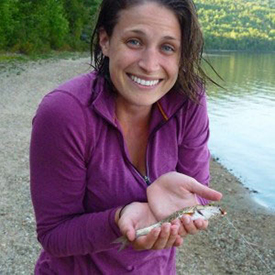
Bonnie Frye Hemphill is a solar designer and activist based in Seattle. Her essay “Fossil Fuel Freedom Fighters” is featured in the new collection Coming of Age at the End of Nature. (Photo: A&R Solar)
Today's pollution has locked us in for 100 years of warming. I can't save the world from climate change, but I can help take the edge off it. There's a very big difference between rising seas that come up a couple of feet or come up 10 feet. The difference is Bangladesh, the difference is Florida.
[MUSIC: Rockaby Baby! Lullaby Baby Trio, “Get Up, Stand Up” on Lullaby Renditions of Bob Marley, Bob Marley, Rockabye Baby Music.]
I've been working on this theme of freedom from fossil fuels for quite a while in my own mind. There's a common theme that those who would want to keep us on fossil fuels forever say, “Well, there's no other way. You drive a car so you must be disingenuous,” and I think that's answering the wrong question. I think the right question is not that I want to drive my car on gasoline. It's that I want to get from point A to point B. Offering freedom from fossil fuel only choices is what we're all about.
[MUSIC: Rockaby Baby! Lullaby Baby Trio, “Get Up, Stand Up” on Lullaby Renditions of Bob Marley, Bob Marley, Rockabye Baby Music.]
There is real anger here. I think there's some stages of grief going on. I'm certainly not angry at those of previous generations who are doing their part for climate action, I'm angry at those who would prevent us, me, from solving their problem.
[MUSIC: Rockaby Baby! Lullaby Baby Trio, “Get Up, Stand Up” on Lullaby Renditions of Bob Marley, Bob Marley, Rockabye Baby Music.]
CURWOOD: That’s writer Bonnie Frye Hemphill. Her essay is part of the collection, “Coming of Age at the End of Nature, A Generation Faces Living on a Changing Planet.”
Related links:
- Listen to the first essay in this series: “Urban Foraging at the End of Nature”
- Listen to the second essay in this series: “High Tech Rain”
- Read the book, “Coming of Age at the End of Nature”
- About Bonnie Frye Hemphill
[MUSIC: Rockaby Baby! Lullaby Baby Trio, “Get Up, Stand Up” on Lullaby Renditions of Bob Marley, Bob Marley, Rockabye Baby Music.]
Coming up...fighting fire with faith and friendship. That's just ahead here on Living on Earth. Stay tuned.
ANNOUNCER: Funding for Living on Earth comes from you our listeners, and United Technologies, combining passion for science with engineering to create solutions designed for sustainability in the aerospace, food refrigeration and building industries. UTC companies such as Otis, Carrier, Pratt & Whitney and UTC Aerospace Systems are helping to move the world forward.
This is PRI, Public Radio International.
[CUTAWAY MUSIC: Giovanni De Chiaro, “The Weeping Willow” on Scott Joplin on Guitar, Scott Joplin, Centaur Records]
BirdNote: Northern Goshawk
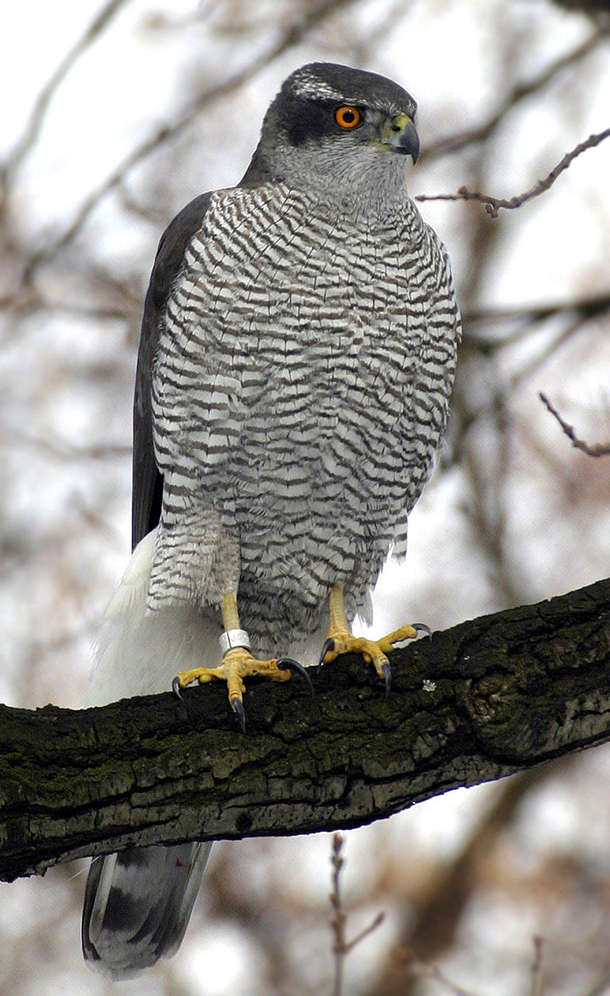
Northern Goshawk (Photo: Bezirk Schöneberg)
CURWOOD: It’s Living on Earth, I’m Steve Curwood.
[MUSIC: BIRDNOTE® THEME]
CURWOOD: Let’s take to the skies now and chase down one of the fastest fliers out there, a bird that falconers have admired and cherished for centuries. As Michael Stein explains, the fierce Northern Goshawk rules the skies above boreal forests.
http://birdnote.org/show/northern-goshawk-esteemed-bird-prey
BirdNote®
Northern Goshawk, Esteemed Bird of Prey
[Northern forest ambience in winter]
All’s quiet on a December morning in a northern Ontario forest. A long, narrow clearing affords a clear view of spruce and birch trees. Then, nervous yelps from a red squirrel interrupt the silence. [Red Squirrel in background] ... and like a silver thunderbolt, [Sound of wings whooshing by] a large bird of prey rushes by low to the ground, in rapid pursuit of a Ruffed Grouse. The grouse flaps madly,
[wings flapping] just eluding its pursuer by winging wildly into a dense thicket.
[Sound of crashing into the underbrush]
The hunter flies up to perch at the edge of the clearing. It’s a Northern Goshawk, one of the most fearsome and admired of all birds of prey. [Northern Goshawk calls] Silver-gray with a bold white slash above its menacing red eye, the elegant goshawk is the largest hawk of the northern forest. Since at least medieval times, falconers have regarded the goshawk as a bird of great distinction. Attila the Hun even wore its image on his helmet.
[Sound of wings whooshing by]

Northern Goshawk in flight (Photo: Paul Williams)
The boreal forest is a vital part of the bird’s range. Yet, during lean years, when Ruffed Grouse and snowshoe hare populations dip – as happens about every ten years – the scarcity of prey brings Northern Goshawks south. It’s then that we're more likely to see these beautiful and fearsome hunters.
[Northern Goshawk calls]
I’m Michael Stein.
###
Written by Bob Sundstrom
Bird sounds provided by The Macaulay Library of Natural Sounds at the Cornell Lab of Ornithology, Ithaca, New York. Calls of Northern Goshawk [110169] recorded by C.D. Duncan and W.W.H. Gunn; Red Squirrel [56723] recorded by W.W. H. Gunn.
Wing sounds from Kessler productions.
Producer: John Kessler
Executive Producer: Chris Peterson
© 2016 Tune In to Nature.org December 2016 Narrator: Michael Stein
CURWOOD: Dive on over to our website, LOE dot org, for some pictures.
Related links:
- Learn more about the Northern Goshawk at Cornell Lab of Ornithology’s All About Birds
- The Northern Goshawk story on the BirdNote website
[MUSIC: The Piano Guys, “Fight Song/Amazing Grace” on Uncharted, Rachel Platten/Dave Bassett/John Newton/Traditional, Sony Music Entertainment and Portrait Records]
Tom Friedman on the Age of Acceleration
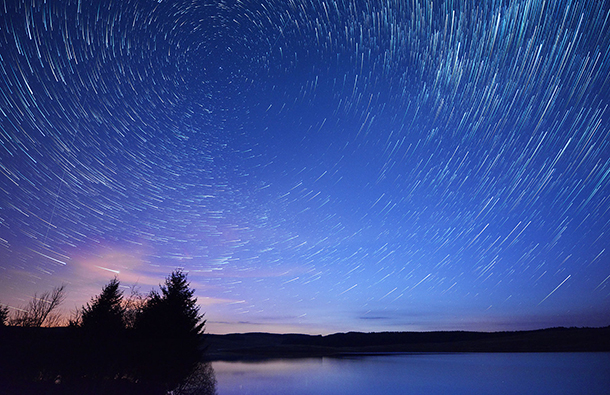
The turn of the 21st century ignited dramatic shifts in globalization, global warming and technology, according to author Tom Friedman. (Photo: Carl Jones, Flickr CC BY-NC-ND 2.0)
CURWOOD: We are hurtling through the early 21st century at a furious pace, buffeted by global market forces, vast leaps in technology, and unprecedented climatic shifts. That’s the view of author and New York Times columnist Tom Friedman, who offers a blueprint of how to cope with this trifecta of sudden and rapid changes. Last week we featured the first part of our conversation about his newest book, "Thank You for Being Late: An Optimist’s Guide in The Age of Accelerations,” and his view that diversity offers the resilience needed to cope with these disruptive forces. Today, we pick up the discussion about how the world can come together and whether globalization helps or hurts efforts to deal with the urgent challenge of climate disruption.
FRIEDMAN: Like everything with globalization, Steve, it is everything, and its opposite. So, on the one hand globalization means more airplanes, more tankers, more CO2 emissions, more economic growth, and we've seen that in just China, but also -- we see it also here in our own economy and all the western economies. On the other hand, it gives you the potential for a global climate deal like we saw in Paris where every country takes on certain CO2 emission obligations, and at the same time, it gives us a world where China can drive down the cost of solar panels like it did with the cost of tennis shoes and we can now be putting solar panels on every home in America if we so choose, and for the first time have truly distributed clean power. So, it's all going to be about the balance of how we manage these upsides and downsides of globalization.
CURWOOD: It's about our choices then?
FRIEDMAN: Exactly, and that is about our values.
CURWOOD: So help me with this trend that we've noticed, this streak of aggressive nationalism that has emerged here in America and Europe in recent years. You know, you would think that globalization should've had the opposite effect.
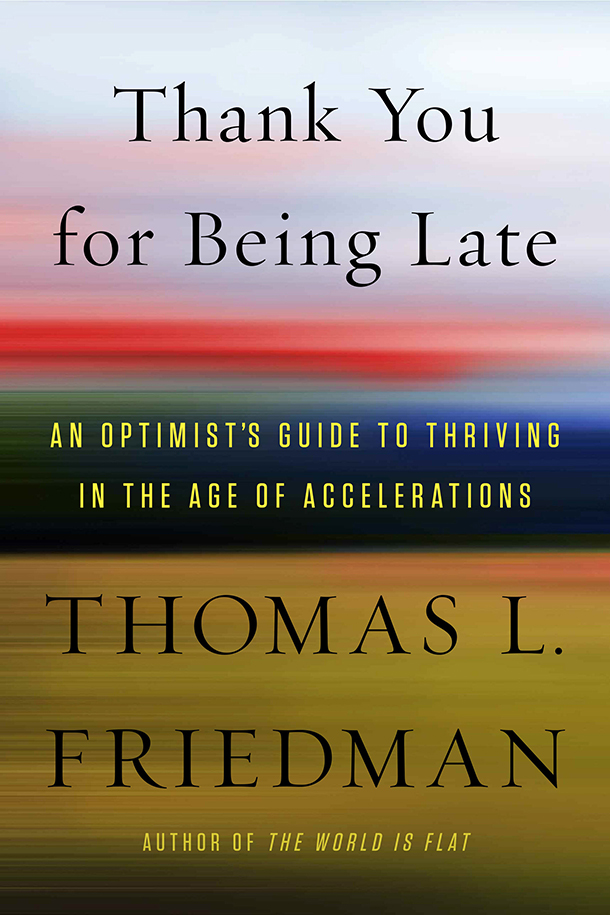
Friedman’s Thank You for Being Late is his seventh published book. (Photo: courtesy of Caroline Zavakos)
FRIEDMAN: Well, again, because it's everything and its opposite, it can be very unsettling and very empowering at the same time. It can be very homogenizing, "I'm losing my culture" and incredibly particularizing, "Wow, I can sit here in America and listen to Zimbabwe radio," if I'm from Zimbabwe. So it's always both and it is how you manage it, and it may be in the age of accelerations for some people, maybe even many people in our country, it got too fast. So, when I think of where we are today in America, I think for some people now...You know, they started going to the grocery store and there was a cashier there speaking to them in different language or wearing a headdress that didn't look like a baseball cap. And so, if you think of the two things that anchor us in the world, our sense of community and our workplace, our job, our identity that comes from that, both have been deeply destabilized by the age of accelerations, and I think we've seen the push back in Brexit and in our own election.
CURWOOD: Let's talk about the election. In Mr. Trump's most recent interview with the Times, you were the one who raised the issue of climate change, and to the surprise of some, Donald Trump says he has an open mind on the issue. Tom, what was your take away from his response to that question?
FRIEDMAN: I don't mean this as an insult to anyone, Steve, but I'm always aware that there's a fine line between an open mind and no mind, and so I'm focused on one thing right now. I spent the last 15 months writing my column to prevent Donald Trump from becoming President of the United States. I opposed his candidacy for myriad different reasons. I suspect I may end up spending the next four years doing the same about his presidency, but it seems to me right now we're in that plastic moment where he is forming his new administration, where he is no longer required to say the craziest things in order to be elected, and it did strike me that during the campaign, although we often quoted a tweet he had once put out that climate change was a hoax, in fact, he had said very little about it in part because of failure of the press to even ask about climate change during the debates. But never mind, I feel like we're in this plastic moment, and what I've been trying to do is explore through my journalism and interview how open his mind is on this truly, and hopefully keep it open long enough for his kids, not his sons, but his daughter and son-in-law, who I suspect on this issue are a lot closer to you and me than Steve Bannon, to begin to have some effect on him and so he doesn't appoint the worst people. And so it was very important for me to get him on the record as saying that he had an open mind.
One of the things you notice when you're with Trump interviewing him because you realize, look, he ran for election over a year and a half, very few people thought he would win, so he attracted some real goofballs and extremists, and they were the bubble around him for a year and a half, and now that he is president, the bubble is opening, he's bringing in a wider group of people, and I'm really encouraging Republicans and Democrats, whoever, to get in there. He is a man who learns not from reading, but from who he talks to. There are many decisions Donald Trump can and will make as president. The vast majority of them will actually be reversible. Even a Supreme Court justice appointment will be reversible. It may take 30 years, but it'll be reversible. We are at a moment on the climate with the decisions he makes could well be irreversible, and that's why I'm focusing on that right now.
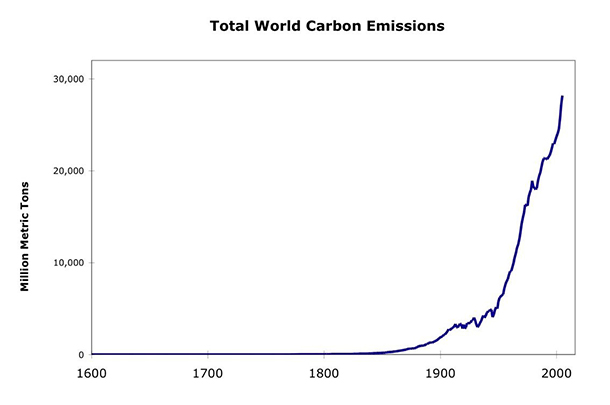
Friedman points to climate change as one of three major forces experiencing exponential change at the beginning of the 21st century. (Photo: Matt Lemmon, Flickr CC BY-SA 2.0)
CURWOOD: Tom, to what extent do you think Mr. Trump on the climate might present the same opportunity that Mr. Nixon had with rapprochement with China? In other words, Nixon came from a party and political think that had no trouble with Communist China and yet he opened the door there. I'm just wondering if somebody were to come up to Mr. Trump on the golf course and say, "Why are you trashing climate change when it is the response to it, the technological response to it is making all kinds of money, and if we don't jump onto that, China and Germany will be leading the world in that, and be making all that money?”
FRIEDMAN: Well, that's exactly the argument I made to him in my column. I pointed out to him that he has many oceanfront golf courses that will soon be ocean floor golf courses, particularly the one at Doral in Miami which is already dealing with flooding related to sea level rise. And the first thing he said when we sat down was, "I read your column." So, I took some succor from that. I try to appeal to him in language that he will understand, and that's language of self-interest, but I also want him to understand that if he makes the wrong decision he could be remembered as the president who really threw away our last best chance to keep climate change at a manageable level.
CURWOOD: The subtitle of your book "Thank You For Being Late" is “An Optimist’s Guide to Thriving in the Age of Accelerations”, so what makes you such an optimist and where does this optimism about the exponentially growing and changing world come from?
FRIEDMAN: I get to travel around this country a lot, and if you want to be an optimist about America, Steve, stand on your head because our country looks so much better from the bottom up than the top down. There are amazing communities in this country. There are failing communities, struggling communities. Many of them voted a certain way in this election but there are also amazing communities where people are collaborating, really pushing politics aside, Democrats and Republicans working together to build parks, to build better schools, to create jobs. I'm talking about my hometown in Minneapolis, 2.9 percent unemployment, I'm talking about the Raleigh-Durhams, the Austins, the Seattles, the Portlands. There are amazing communities in this country, and they are actually driving the country forward. And I think understanding these communities, what makes them so dynamic, and sharing their innovations is one of the most important things I as a journalist can do right now. And they do leave me optimistic. My friend and teacher, Amory Lovins, a great physicist who when anyone likes to say are you an optimist or pessimist, he likes to says, “I'm neither, because they are just too different forms of fatalism.” One says, everything's going to be great, the other always says, everything's going to be awful. Amory always says, “I believe in applied hope. That is, I'm hopeful. I have reasons to be hopeful, but I understand you've got to apply yourself, your group, your party, your community, to driving that hope.” And what I find in these communities is that there are a lot of people applying hope. There are a lot of people who want to get caught trying, making this a better and more inclusive country, and that is the source of my optimism.
CURWOOD: Tom, your book has a theme song, you say.
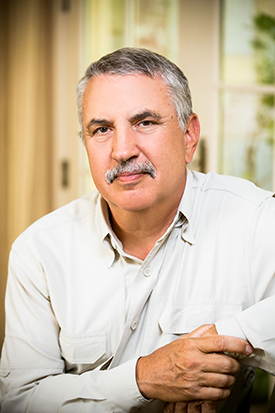
Tom Friedman is a New York Times columnist and bestselling author. (Photo: Ralph Alswang)
FRIEDMAN: Yeah, it's actually by one of my favorite singers, Brandi Carlile. The song is called "The Eye", “e-y-e,” and the main refrain is "I wrapped your love around me like a chain, but I never was afraid that it would die. You can dance in a hurricane, but only if you're standing in the eye." And that, Steve, in one little verse, what this book is about. We are being asked to dance in a hurricane. These three massive accelerations in the market, Mother Nature, Moore's law. We have a president who is selling us a wall against those forces.
My book is promoting an eye, an eye that moves with the storm, draws energy from it, but creates a platform of dynamic stability within it. For me, the eye is the healthy community, a place where everyone can feel connected, protected, and respected, and I think politics in the next four years in America and many places around the world is going to be between the wall people and the eye people, and I've written this book as a manifesto for the eye people.
CURWOOD: Tom Friedman is a best-selling author and regular New York Times columnist. His latest book is being called, "Thank You for Being Late". Tom, and thank you for being on the program.
FRIEDMAN: Thank you for being on time, Steve. I really appreciate it.
Related links:
- Part 1 of our interview with Tom Friedman on the Age of Acceleration
- Our interview with Tom Friedman for his earlier work, Hot, Flat and Crowded
- Read Tom’s latest columns for the New York Times here
- Tom Friedman’s newest book, Thank You For Being Late
[MUSIC: Brandi Carlile, “The Eye” on The Firewatcher’s Daughter, ATO Records
https://www.youtube.com/watch?v=Wl_eNu4NUVI]
Friendship, Faith and Firefighters
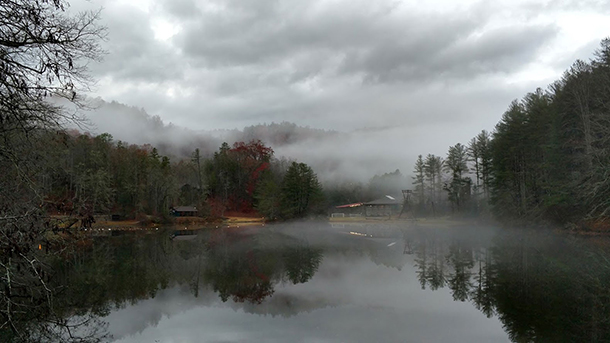
Evening sets in at the Ramah Darom camp on Wednesday, Nov. 30. (Photo: Sean Powers)
CURWOOD: At the end of November, hundreds of firefighters from all over the country battled the Rock Mountain Fire in North Georgia. Fighting the huge blaze in the tinder dry hills was a tough battle, but they were offered an unusual place to stay - a local Orthodox Jewish camp. It opened its doors to these crews as they fought to contain the blaze, and reporter Sean Powers went along for a visit.
[RAINFALL]
POWERS: Heavy rain falls at Ramah Darom, a Jewish camp whose Hebrew name means “southern high place.” It’s located in the North Georgia mountains, in the town of Clayton, just a couple hours from Atlanta. Russell Schafer is there, he’s a firefighter from Colorado. His equipment is basic...
SCHAFFER: The only thing we have on our truck is the engineer's box that has all our water stuff and on the other side that has extinguishers.
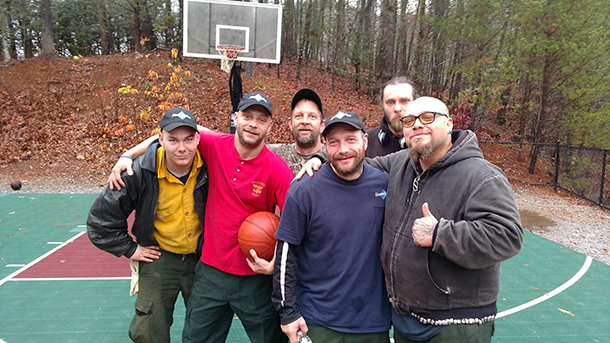
Members of Oregon-based Diamond Fire at Ramah Darom, a Jewish camp in Clayton, Georgia. They stayed here when they weren't out trying to contain wildfires in the North Georgia mountains. (Photo: Sean Powers)
POWERS: Schafer has been waiting all day to head back into the woods to keep working. The storm is keeping him from doing that. I notice he has what appears to be ash on his shirt.
SCHAFFER: No, it’s just 18 days of dirty.
POWERS: Schaffer says being out here is worth it if it means he can save lives and memories. His wife and children are waiting for him back home in Colorado. Here, he's fighting for other families.
SCHAFFER: I’ve been on three fires this season: Hayden Pass in Salatin, Colorado. I was on Twin Lakes in Meeteetse, Wyoming. And this one. It’s almost like a non-combative type of army.
FRANKLIN: Our understanding was, these firefighters are accustomed to sleeping in tent cities out west.
POWERS: That’s Anthony Franklin, the general manager at Ramah Darom. When these firefighters headed south to fight this fire, they found this campsite that can house hundreds of people in cabins and hotels. Franklin says, so far, more 340 firefighters is the one night record.
FRANKLIN: It is November, and we are in the Georgia mountains, and we wanted to offer them at least a nice mattress to sleep on even if it was in a bunking situation.
[CAR, DRIVING SOUNDS]
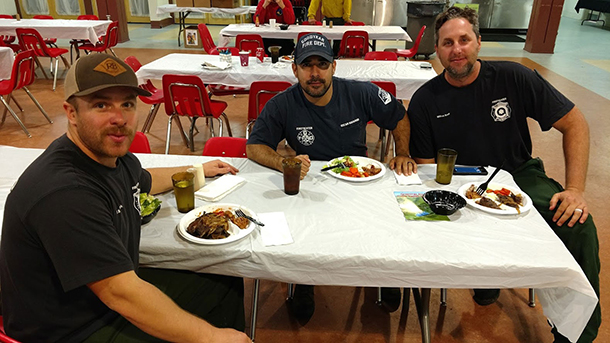
Firefighters from Arizona who fought the wildfire in Clayton, Georgia having dinner at the Ramah Darom camp (Photo: Sean Powers)
POWERS: Franklin drives me around the property. There are eight fire hydrants across the camp, and a tank with 40,000 gallons of water.
FRANKIN: We had already put out a fire hose. Just in case the fire had come our way we could have put water on it, and try to push it back.
POWERS: I asked him who would have done that.
FRANKLIN: My maintenance guys and myself.
POWERS: But these crews haven't had to do that. The fire didn’t get close enough to the campsite. Instead, out of town crews largely relied on water from lakes, rivers, and streams. Franklin says, this whole experience of taking in these firefighters has been eye opening.
FRANKLIN: It’s been very humbling. Very encouraging to meet people of all walks and talks and become friends and realize, you know what? They’re just like the rest of us.
POWERS: We approach a group of them standing outside a cabin. They call themselves Diamond Fire, based in Southern Oregon.
FRANKLIN: How’re ya’ll?
GUYS: Hungry!
FRANKLIN: Hungry?
GUYS: Better after a shower.
POWERS: Andy Lamb is a member of Diamond Fire. The group works to control blazes and restore habitats to fire-devastated areas. Lamb has been doing this for more than a decade. His reaction when he found out he was staying here instead of camping outside.
LAMB: Yee haw! [LAUGHS] Since we’re from Oregon, this is a whole different world over here. Hospitality. Southern hospitality is real.
POWERS: It’s that kind of appreciation that continues to fuel Yoshi Patrick’s drive to respond to dangerous fires. He’s also a member of Diamond Fire.
PATRICK: What kept me out here was the first time...It actually kind of brings a tear to my eye every time I think about it…but we were driving through a town and you have children on the side of the road saying “You are heroes,” and smiling and waving and saying thank you and… [SNIFFLES] Excuse me. Um, you can’t beat that.
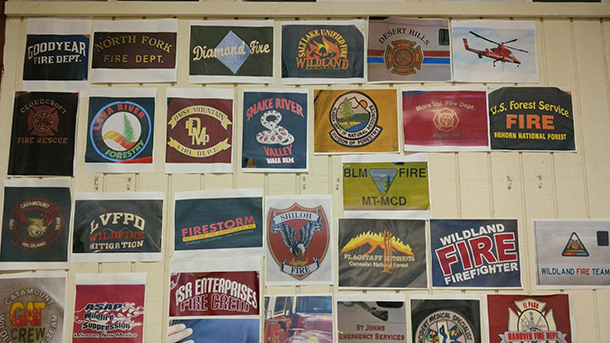
A wall at the Ramah Darom camp features some of the firefighting companies from across the country that showed up to help contain the wildfires in North Georgia. (Photo: Sean Powers)
POWERS: By dinner time, the different crews gather in the camp’s cafeteria.
[SIZZLING ON STOVE]
Glazed carrots cook on an open stove. In the kitchen, Executive Chef Todd Jones is hard at work preparing a kosher meal that also includes lamb and red roasted potatoes.
JONES: Let’s get these lamb steaks in a pan.
POWERS: Chef Jones says food is a way to thank these firefighters.
JONES: They’re big guys. They eat a lot. They require a lot of protein. Yeah, they burn a lot of calories a day, probably three or four times what you or I would in one day, just with the type of labor that they do. So, it’s almost like a family. We’ll be seeing these same guys for a long time. It’s a very small price to pay to cook for them.
POWERS: A small price indeed. In the cafeteria there’s a wall honoring the different firefighting teams that have played a role in stopping the Rock Mountain fire. While the fire is now gone, the firefighters will remain, honored, in memory.
For Living on Earth, I'm Sean Powers in Atlanta.
CURWOOD: Sean Powers reports for Georgia Pubic Broadcasting.
Related links:
- The Atlanta Journal-Constitution: “North Georgia fires largely contained, Southern hospitality is praised”
- The fire is being investigated as a human-caused incident
- Camp Ramah Darom in North Georgia
- About producer Sean Powers
[MUSIC: Aine Minogue “Doves Return” Celtic harp, recorded live at LOE UMB Studios 11/2015 Naomi Arenberg from Home for the Holidays LOE Show 12/25/15]
CURWOOD: Next time, on Living on Earth. It's our holiday special, music and storytellers with tales of hope and peace.
BAUM: I wanted you to see that God lives in everything, and don't you ever let anyone tell you to hate another. Muslims, Christians, Jews...they are all your family.
CURWOOD: That's next time on Living on Earth.
[MUSIC: John Fahey, “Old Country Rock” on Let Go, traditional American/arr.J. Fahey-T. Robb, Varrick Records]
CURWOOD: Living on Earth is produced by the World Media Foundation. Our crew includes Naomi Arenberg, Bobby Bascomb, Aidan Connelly, Savannah Christiansen, Jenni Doering, Jaime Kaiser, Don Lyman, Alex Metzger, Helen Palmer, Adelaide Chen, and Jolanda Omari. Tom Tiger engineered our show, with help from Jake Rego and Noel Flatt. Alison Lirish Dean composed our themes. You can hear us anytime at LOE.org - and like us, please, on our Facebook page - PRI’s Living on Earth. And we tweet from @LivingOnEarth. I'm Steve Curwood. Thanks for listening.
ANNOUNCER1: Funding for Living on Earth comes from you, our listeners, and from the University of Massachusetts, Boston, in association with its School for the Environment, developing the next generation of environmental leaders. And from the Grantham Foundation for the protection of the environment, supporting strategic communications and collaboration in solving the world’s most pressing environmental problems. Support also comes from the Energy Foundation, serving the public interest by helping to build a strong, clean, energy economy, from Gilman Ordway, and from SolarCity, America’s solar power provider. SolarCity is dedicated to revolutionizing the way energy is delivered by giving customers a renewable alternative to fossil fuels. Information at 888-997-1703. That’s 888-997-1703.
ANNOUNCER2: PRI. Public Radio International.
Living on Earth wants to hear from you!
Living on Earth
62 Calef Highway, Suite 212
Lee, NH 03861
Telephone: 617-287-4121
E-mail: comments@loe.org
Newsletter [Click here]
Donate to Living on Earth!
Living on Earth is an independent media program and relies entirely on contributions from listeners and institutions supporting public service. Please donate now to preserve an independent environmental voice.
NewsletterLiving on Earth offers a weekly delivery of the show's rundown to your mailbox. Sign up for our newsletter today!
 Sailors For The Sea: Be the change you want to sea.
Sailors For The Sea: Be the change you want to sea.
 The Grantham Foundation for the Protection of the Environment: Committed to protecting and improving the health of the global environment.
The Grantham Foundation for the Protection of the Environment: Committed to protecting and improving the health of the global environment.
 Contribute to Living on Earth and receive, as our gift to you, an archival print of one of Mark Seth Lender's extraordinary wildlife photographs. Follow the link to see Mark's current collection of photographs.
Contribute to Living on Earth and receive, as our gift to you, an archival print of one of Mark Seth Lender's extraordinary wildlife photographs. Follow the link to see Mark's current collection of photographs.
 Buy a signed copy of Mark Seth Lender's book Smeagull the Seagull & support Living on Earth
Buy a signed copy of Mark Seth Lender's book Smeagull the Seagull & support Living on Earth

